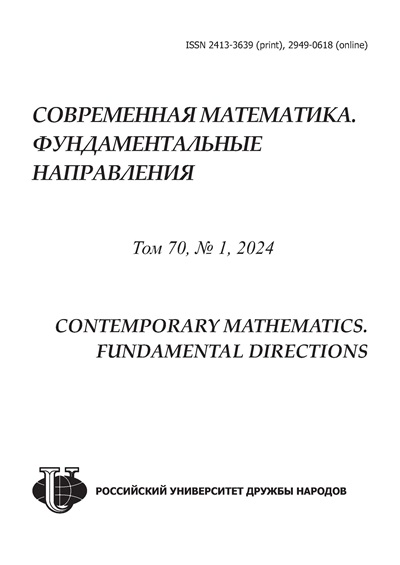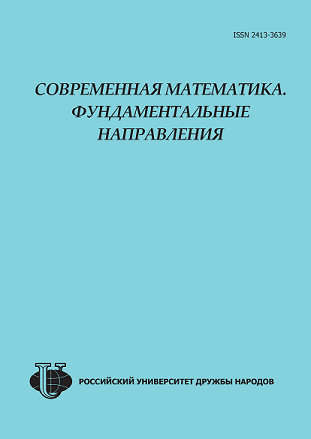Contemporary Mathematics. Fundamental Directions
Editor-in-Chief: Revaz Valerianovich Gamkrelidze, Academician of the Russian Academy of Sciences, Professor, Doctor of Physical and Mathematical Sciences, Steklov Mathematical Institute, Russian Academy of Sciences, Moscow, Russian Federation
ISSN: 2413-3639 (print), 2949-0618 (online). Founded in 2003 г. Publication frequency: quarterly. Peer-Review: blind
Open Access: Open Access. APC: no article processing charge. Indexation: elibrary.ru, mathnet.ru, Google Scholar, Lens, Research4Life
Publication language: Russian
Publisher: Peoples’ Friendship University of Russia named after Patrice Lumumba (RUDN University)
The journal "Contemporary Mathematics. Fundamental Directions" is published both in English and Russian.
The journal is devoted to the actual topics of contemporary mathematics.
The journal is focused on publication of surveys as well as articles containing novel results.
The English version is published by "Springer Science+Business Media, Inc." (USA) in the series "Journal of Mathematical Sciences." ISSN: 1072-3374 (print version) ISSN: 1573-8795 (electronic version)
Current Issue
Vol 70, No 1 (2024): Functional spaces. Differential operators. Problems of mathematics education
- Year: 2024
- Articles: 11
- URL: https://journals.rudn.ru/CMFD/issue/view/1751
- DOI: https://doi.org/10.22363/2413-3639-2024-70-1
Full Issue
Articles
 1-14
1-14


On discrete models of Boltzmann-type kinetic equations
Abstract
The known nonlinear kinetic equations, in particular, the wave kinetic equation and the quantum Nordheim–Uehling–Uhlenbeck equations are considered as a natural generalization of the classical spatially homogeneous Boltzmann equation. To this goal we introduce the general Boltzmann-type kinetic equation that depends on a function of four real variables \(F(x,y; v,w)\). The function \(F\) is assumed to satisfy certain simple relations. The main properties of this kinetic equation are studied. It is shown that the above mentioned specific kinetic equations correspond to different polynomial forms of the function \(F\). Then the problem of discretization of the general Boltzmann-type kinetic equation is considered on the basis of ideas similar to those used for construction of discrete velocity models of the Boltzmann equation. The main attention is paid to discrete models of the wave kinetic equation. It is shown that such models have a monotone functional similarly to the Boltzmann \(H\)-function. The theorem of existence, uniqueness and convergence to equilibrium of solutions to the Cauchy problem with any positive initial conditions is formulated and discussed. The differences in long time behaviour between solutions of the wave kinetic equation and solutions of its discrete models are also briefly discussed.
 15-24
15-24


The Sylvester problem and uniqueness sets in classes of entire functions
Abstract
In this paper, we study the problem of finding, by a chosen sequence of complex numbers tending to infinity, the widest possible class of entire functions in a given scale for which this sequence is a uniqueness set. Within the framework of this general problem, we establish uniqueness theorems in various classes of entire functions, distinguished by restrictions on the type and indicator under a refined order. In particular, we complement the previously proven uniqueness theorem, using the concept of the Sylvester circle of the indicator diagram of an entire function of exponential type. We discuss the accuracy of the results obtained and their connection with known facts.
 25-37
25-37


The Riemann problem for the main model cases of the Euler-Poisson equations
Abstract
In this paper, we construct a solution to the Riemann problem for an inhomogeneous nonstrictly hyperbolic system of two equations, which is a corollary of the Euler-Poisson equations without pressure [9]. These equations can be considered for the cases of attractive and repulsive forces as well as for the cases of zero and nonzero underlying density background. The solution to the Riemann problem for each case is nonstandard and contains a delta-shaped singularity in the density component. In [16], solutions were constructed for the combination corresponding to the cold plasma model (repulsive force and nonzero background density). In this paper, we consider the three remaining cases.
 38-52
38-52


Averaging method for problems on quasiclassical asymptotics
Abstract
The averaging method is developed for operators with rapidly oscillating coefficients, intended for use in problems of quasiclassical asymptotics and not assuming a periodic structure of coefficient oscillations. Algebras of locally averaged functions are studied, an averaging theorem for differential operators of general form is proved, and some features of the method are illustrated using the example of the wave equation.
 53-76
53-76


On limit cycles of autonomous systems
Abstract
We consider the problem of the existence of limit cycles for autonomous systems of differential equations. We present quite elementary considerations that can be useful in discussing qualitative issues that arise in the course of ordinary differential equations. We establish that any simple closed curve defined by the equation \(F(x,y)=1\) with a sufficiently general function \(F\) is a limit cycle for the corresponding autonomous system on the plane (and even for an infinite number of systems depending on the real parameter). These systems are written out explicitly. We analyze in detail several specific examples. Graphic illustrations are provided.
 77-98
77-98


Coercive estimates for multilayer degenerate di erential operators
Abstract
We obtain the conditions under which a given multilayer differential operator \(P(D)\) (polynomial \(P(\xi)\)) is more powerful than operator \(Q(D)\) (polynomial \(Q(\xi)\)). This is used to obtain estimates of monomials, which, in turn, using the theory of Fourier multipliers, is used to obtain coercive estimates of derivatives of functions through the differential operator \(P(D)\) applied to these functions.
 99-120
99-120


On subordination conditions for systems of minimal di erential operators
Abstract
In this paper, we provide a review of results on a priori estimates for systems of minimal differential operators in the scale of spaces \(L^p(\Omega),\) where \(p\in[1,\infty].\) We present results on the characterization of elliptic and \(l\)-quasielliptic systems using a priori estimates in isotropic and anisotropic Sobolev spaces \(W_{p,0}^l(\mathbb R^n),\) \(p\in[1,\infty].\) For a given set \(l=(l_1,\dots,l_n)\in\mathbb N^n\) we prove criteria for the existence of \(l\)-quasielliptic and weakly coercive systems and indicate wide classes of weakly coercive in \(W_{p,0}^l(\mathbb R^n),\) \(p\in[1,\infty],\) nonelliptic, and nonquasielliptic systems. In addition, we describe linear spaces of operators that are subordinate in the \(L^\infty(\mathbb R^n)\)-norm to the tensor product of two elliptic differential polynomials.
 121-149
121-149


Lower average estimate for the minimum modulus on circles foran entire function of genus zero
Abstract
The article was written based on the materials of the joint report of the authors, made by them at the Sixth International Conference “Functional spaces. Differential operators. Problems of mathematical education,” dedicated to the centenary of the birth of Corresponding Member of the Russian Academy of Sciences, Academician of the European Academy of Sciences L. D. Kudryavtsev. For an entire function represented by a canonical product of genus zero with positive roots, the following result is proved. For any \(\delta\in(0,1/3]\), the minimum modulus of such a function exceeds on average the maximum of its modulus raised to the power \(-1-\delta,\) on any segment whose end ratio is equal to \(\exp( 2/\delta).\) The main theorem is illustrated by two examples. The first of them shows that instead of the exponent \(-1-\delta\) it is impossible to take \(-1.\) The second example demonstrates the impossibility of replacing the value \(\exp(2/\delta)\) by the value \(28/(15\delta)\) in the theorem for small \(\delta.\)
 150-162
150-162


To geometric aspects of in nite-dimensional dynamical systems
Abstract
The main goal of the work is to construct analogues of Christoffel symbols for infinitedimensional systems and on this basis to obtain geodesic equations for such systems. These analogies are of particular interest in terms of identifying the relationship between the dynamics of systems with an infinite number of degrees of freedom and Riemannian geometry, as well as geometry defined by the pseudo-Riemannian metric.
 163-172
163-172


On recovery of the solution to the Cauchy problem for the singular heat equation
Abstract
We present the results related to the solution of the problem of the best recovery of the solution to the Cauchy problem for the heat equation with the B-elliptic Laplace-Bessel operator in spatial variables from an exactly or approximately known finite set of temperature profiles.
 173-187
173-187












